Business Law Assessment 1: UK Legal System and Employment Law
VerifiedAdded on 2023/06/10
|9
|2581
|359
Report
AI Summary
This report, prepared for a Business Law assessment, provides a comprehensive overview of the UK legal system. It begins by defining law and classifying it into civil and criminal categories, offering examples and distinctions. The report then explores the roles of the High Court and Supreme Court within the English legal system. It delves into the sources of law, specifically case law and legislation, including delegated legislation. Furthermore, the report examines UK employment law, outlining the statutory duties of employers and addressing wrongful and unfair dismissal actions. The content covers key aspects of the legal system relevant to business operations, providing a foundational understanding of the laws governing businesses and employment in the UK.
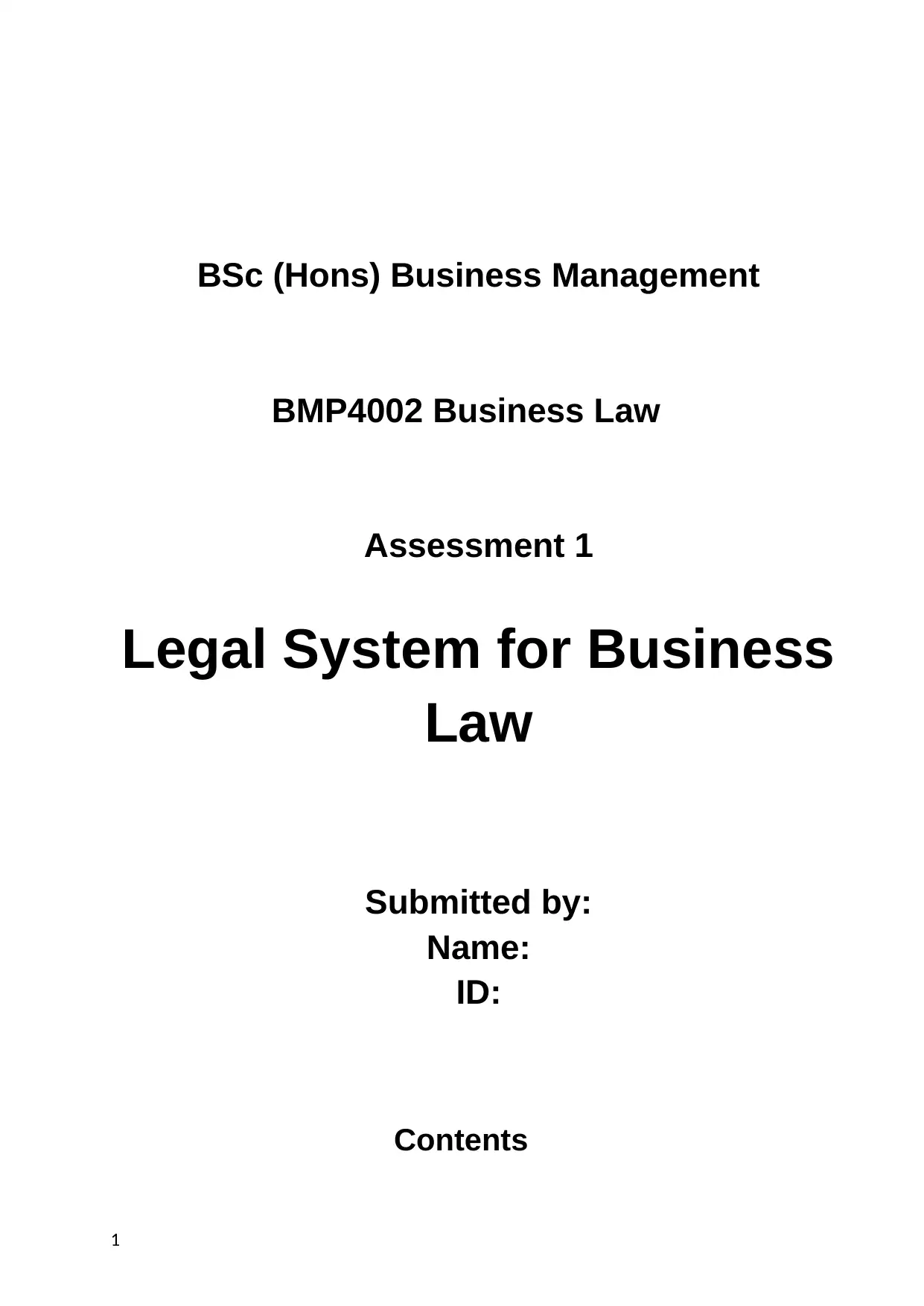
BSc (Hons) Business Management
BMP4002 Business Law
Assessment 1
Legal System for Business
Law
Submitted by:
Name:
ID:
Contents
1
BMP4002 Business Law
Assessment 1
Legal System for Business
Law
Submitted by:
Name:
ID:
Contents
1
Paraphrase This Document
Need a fresh take? Get an instant paraphrase of this document with our AI Paraphraser
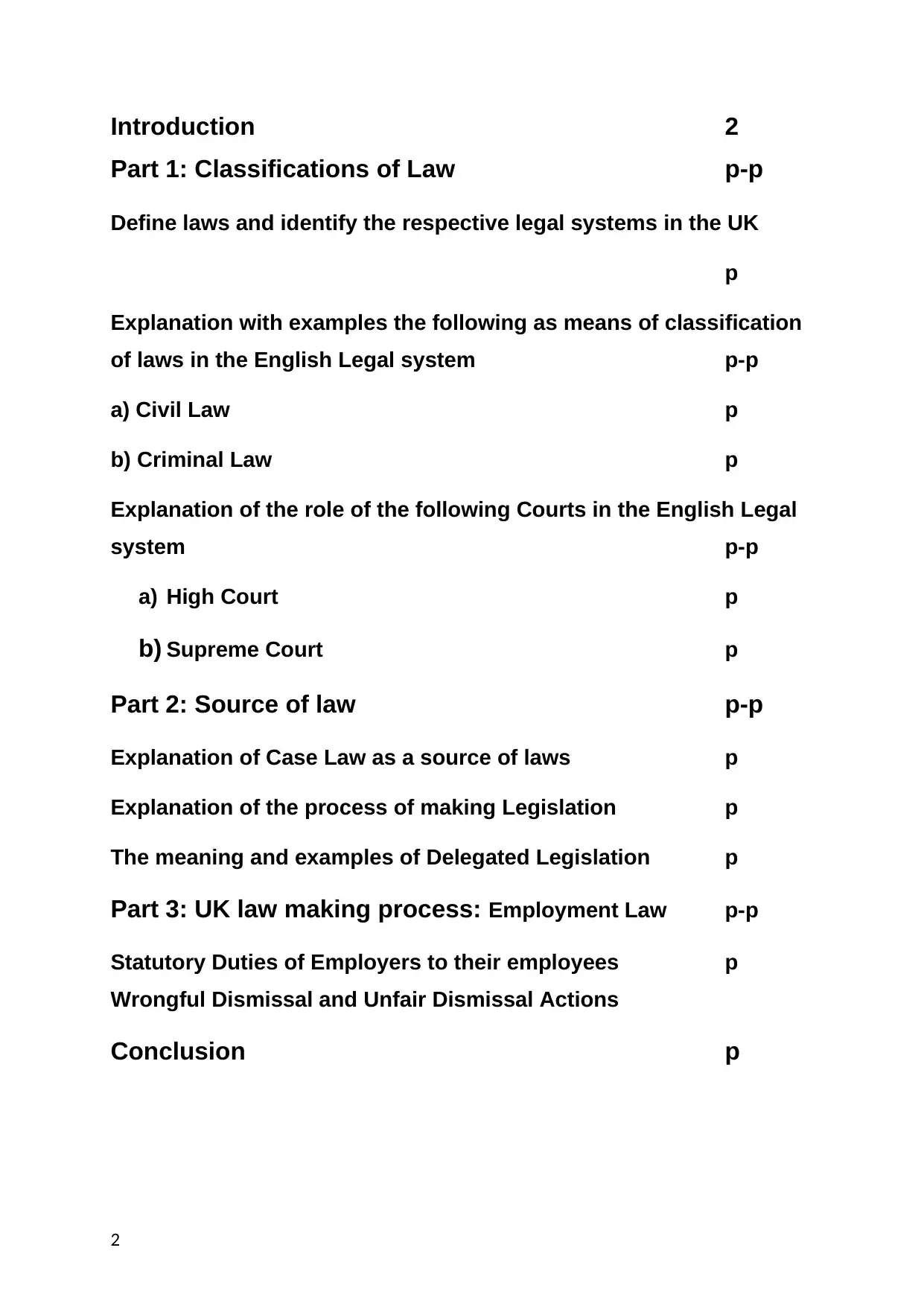
Introduction 2
Part 1: Classifications of Law p-p
Define laws and identify the respective legal systems in the UK
p
Explanation with examples the following as means of classification
of laws in the English Legal system p-p
a) Civil Law p
b) Criminal Law p
Explanation of the role of the following Courts in the English Legal
system p-p
a) High Court p
b) Supreme Court p
Part 2: Source of law p-p
Explanation of Case Law as a source of laws p
Explanation of the process of making Legislation p
The meaning and examples of Delegated Legislation p
Part 3: UK law making process: Employment Law p-p
Statutory Duties of Employers to their employees p
Wrongful Dismissal and Unfair Dismissal Actions
Conclusion p
2
Part 1: Classifications of Law p-p
Define laws and identify the respective legal systems in the UK
p
Explanation with examples the following as means of classification
of laws in the English Legal system p-p
a) Civil Law p
b) Criminal Law p
Explanation of the role of the following Courts in the English Legal
system p-p
a) High Court p
b) Supreme Court p
Part 2: Source of law p-p
Explanation of Case Law as a source of laws p
Explanation of the process of making Legislation p
The meaning and examples of Delegated Legislation p
Part 3: UK law making process: Employment Law p-p
Statutory Duties of Employers to their employees p
Wrongful Dismissal and Unfair Dismissal Actions
Conclusion p
2
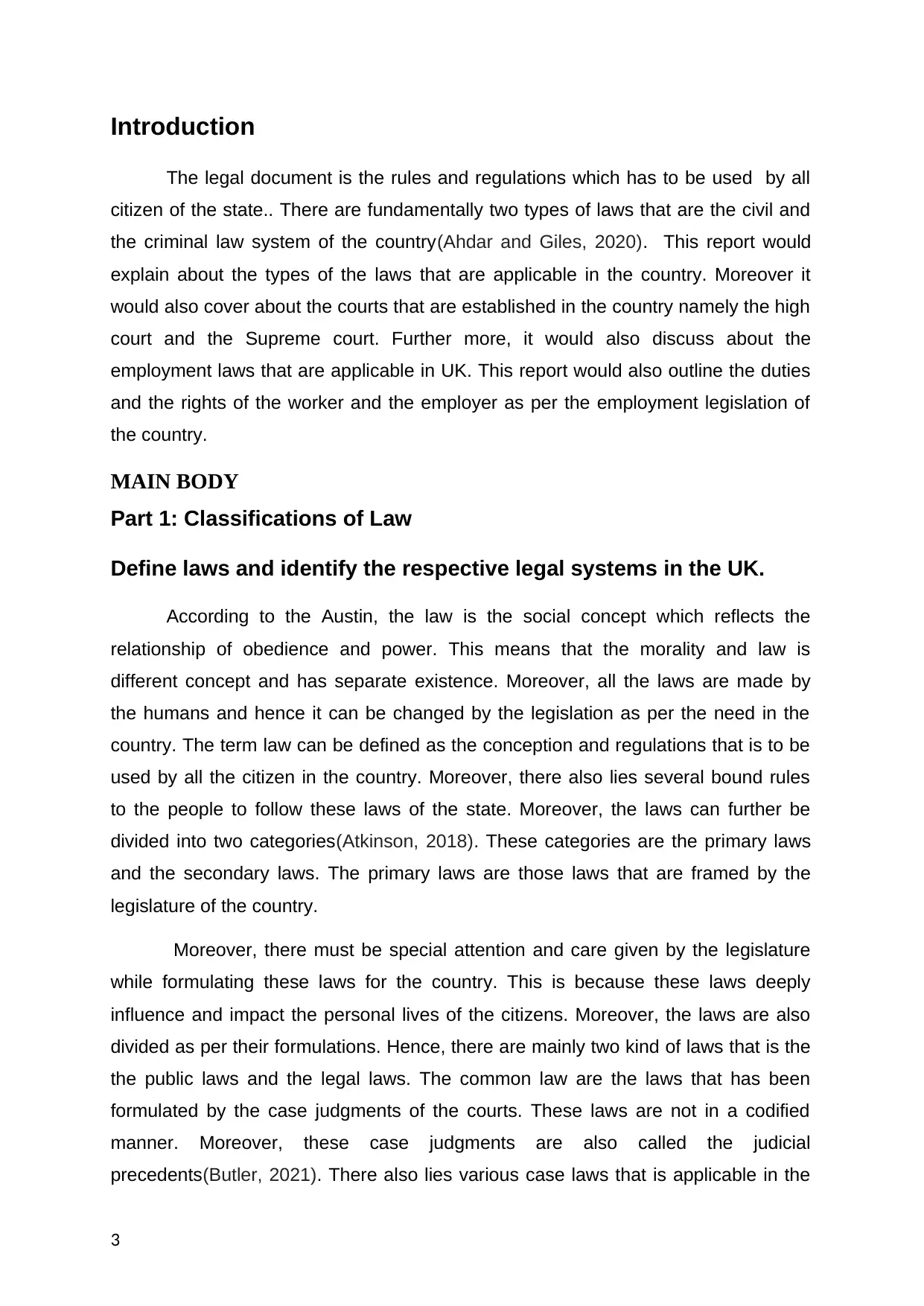
Introduction
The legal document is the rules and regulations which has to be used by all
citizen of the state.. There are fundamentally two types of laws that are the civil and
the criminal law system of the country(Ahdar and Giles, 2020). This report would
explain about the types of the laws that are applicable in the country. Moreover it
would also cover about the courts that are established in the country namely the high
court and the Supreme court. Further more, it would also discuss about the
employment laws that are applicable in UK. This report would also outline the duties
and the rights of the worker and the employer as per the employment legislation of
the country.
MAIN BODY
Part 1: Classifications of Law
Define laws and identify the respective legal systems in the UK.
According to the Austin, the law is the social concept which reflects the
relationship of obedience and power. This means that the morality and law is
different concept and has separate existence. Moreover, all the laws are made by
the humans and hence it can be changed by the legislation as per the need in the
country. The term law can be defined as the conception and regulations that is to be
used by all the citizen in the country. Moreover, there also lies several bound rules
to the people to follow these laws of the state. Moreover, the laws can further be
divided into two categories(Atkinson, 2018). These categories are the primary laws
and the secondary laws. The primary laws are those laws that are framed by the
legislature of the country.
Moreover, there must be special attention and care given by the legislature
while formulating these laws for the country. This is because these laws deeply
influence and impact the personal lives of the citizens. Moreover, the laws are also
divided as per their formulations. Hence, there are mainly two kind of laws that is the
the public laws and the legal laws. The common law are the laws that has been
formulated by the case judgments of the courts. These laws are not in a codified
manner. Moreover, these case judgments are also called the judicial
precedents(Butler, 2021). There also lies various case laws that is applicable in the
3
The legal document is the rules and regulations which has to be used by all
citizen of the state.. There are fundamentally two types of laws that are the civil and
the criminal law system of the country(Ahdar and Giles, 2020). This report would
explain about the types of the laws that are applicable in the country. Moreover it
would also cover about the courts that are established in the country namely the high
court and the Supreme court. Further more, it would also discuss about the
employment laws that are applicable in UK. This report would also outline the duties
and the rights of the worker and the employer as per the employment legislation of
the country.
MAIN BODY
Part 1: Classifications of Law
Define laws and identify the respective legal systems in the UK.
According to the Austin, the law is the social concept which reflects the
relationship of obedience and power. This means that the morality and law is
different concept and has separate existence. Moreover, all the laws are made by
the humans and hence it can be changed by the legislation as per the need in the
country. The term law can be defined as the conception and regulations that is to be
used by all the citizen in the country. Moreover, there also lies several bound rules
to the people to follow these laws of the state. Moreover, the laws can further be
divided into two categories(Atkinson, 2018). These categories are the primary laws
and the secondary laws. The primary laws are those laws that are framed by the
legislature of the country.
Moreover, there must be special attention and care given by the legislature
while formulating these laws for the country. This is because these laws deeply
influence and impact the personal lives of the citizens. Moreover, the laws are also
divided as per their formulations. Hence, there are mainly two kind of laws that is the
the public laws and the legal laws. The common law are the laws that has been
formulated by the case judgments of the courts. These laws are not in a codified
manner. Moreover, these case judgments are also called the judicial
precedents(Butler, 2021). There also lies various case laws that is applicable in the
3
⊘ This is a preview!⊘
Do you want full access?
Subscribe today to unlock all pages.

Trusted by 1+ million students worldwide
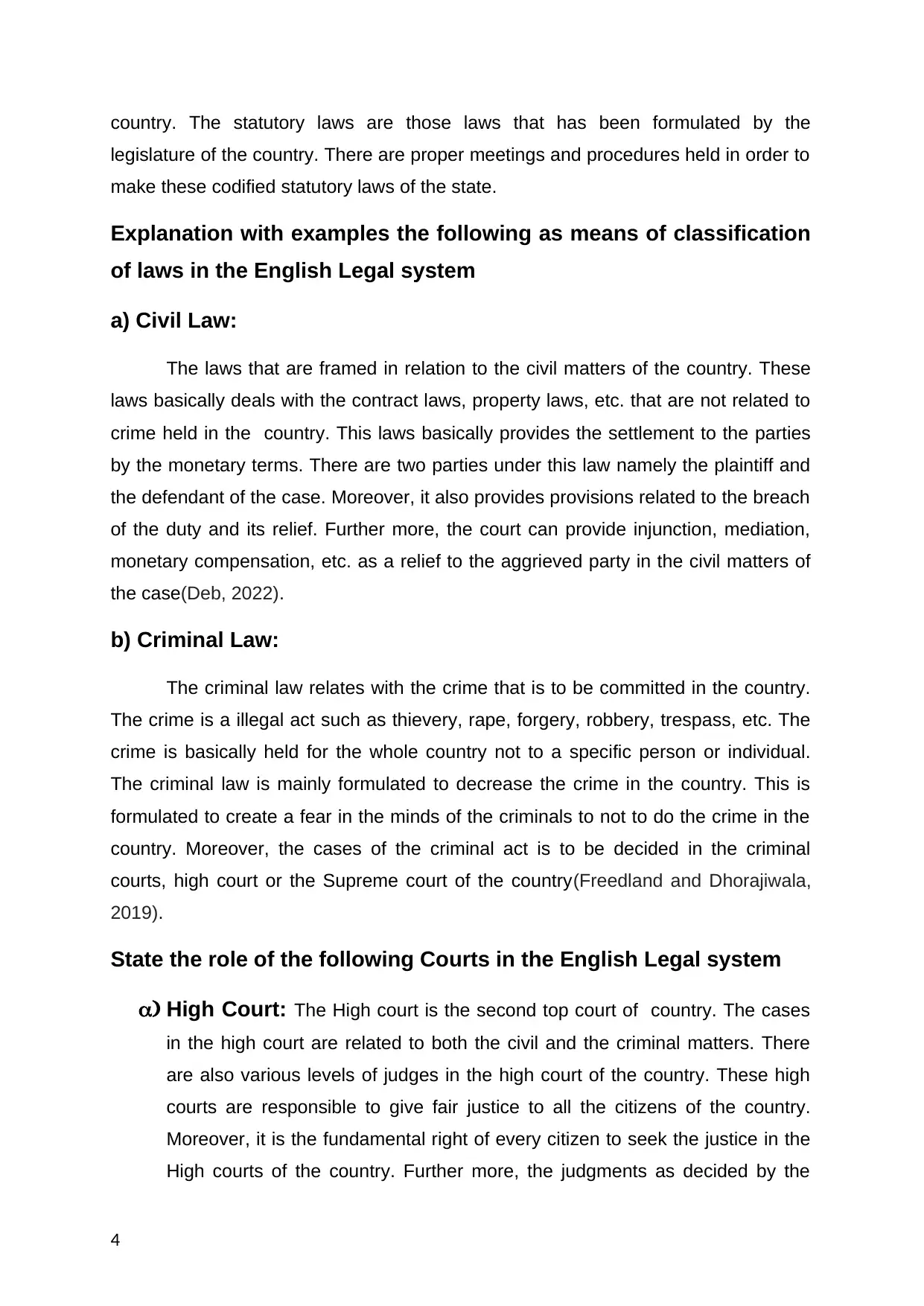
country. The statutory laws are those laws that has been formulated by the
legislature of the country. There are proper meetings and procedures held in order to
make these codified statutory laws of the state.
Explanation with examples the following as means of classification
of laws in the English Legal system
a) Civil Law:
The laws that are framed in relation to the civil matters of the country. These
laws basically deals with the contract laws, property laws, etc. that are not related to
crime held in the country. This laws basically provides the settlement to the parties
by the monetary terms. There are two parties under this law namely the plaintiff and
the defendant of the case. Moreover, it also provides provisions related to the breach
of the duty and its relief. Further more, the court can provide injunction, mediation,
monetary compensation, etc. as a relief to the aggrieved party in the civil matters of
the case(Deb, 2022).
b) Criminal Law:
The criminal law relates with the crime that is to be committed in the country.
The crime is a illegal act such as thievery, rape, forgery, robbery, trespass, etc. The
crime is basically held for the whole country not to a specific person or individual.
The criminal law is mainly formulated to decrease the crime in the country. This is
formulated to create a fear in the minds of the criminals to not to do the crime in the
country. Moreover, the cases of the criminal act is to be decided in the criminal
courts, high court or the Supreme court of the country(Freedland and Dhorajiwala,
2019).
State the role of the following Courts in the English Legal system
a) High Court: The High court is the second top court of country. The cases
in the high court are related to both the civil and the criminal matters. There
are also various levels of judges in the high court of the country. These high
courts are responsible to give fair justice to all the citizens of the country.
Moreover, it is the fundamental right of every citizen to seek the justice in the
High courts of the country. Further more, the judgments as decided by the
4
legislature of the country. There are proper meetings and procedures held in order to
make these codified statutory laws of the state.
Explanation with examples the following as means of classification
of laws in the English Legal system
a) Civil Law:
The laws that are framed in relation to the civil matters of the country. These
laws basically deals with the contract laws, property laws, etc. that are not related to
crime held in the country. This laws basically provides the settlement to the parties
by the monetary terms. There are two parties under this law namely the plaintiff and
the defendant of the case. Moreover, it also provides provisions related to the breach
of the duty and its relief. Further more, the court can provide injunction, mediation,
monetary compensation, etc. as a relief to the aggrieved party in the civil matters of
the case(Deb, 2022).
b) Criminal Law:
The criminal law relates with the crime that is to be committed in the country.
The crime is a illegal act such as thievery, rape, forgery, robbery, trespass, etc. The
crime is basically held for the whole country not to a specific person or individual.
The criminal law is mainly formulated to decrease the crime in the country. This is
formulated to create a fear in the minds of the criminals to not to do the crime in the
country. Moreover, the cases of the criminal act is to be decided in the criminal
courts, high court or the Supreme court of the country(Freedland and Dhorajiwala,
2019).
State the role of the following Courts in the English Legal system
a) High Court: The High court is the second top court of country. The cases
in the high court are related to both the civil and the criminal matters. There
are also various levels of judges in the high court of the country. These high
courts are responsible to give fair justice to all the citizens of the country.
Moreover, it is the fundamental right of every citizen to seek the justice in the
High courts of the country. Further more, the judgments as decided by the
4
Paraphrase This Document
Need a fresh take? Get an instant paraphrase of this document with our AI Paraphraser
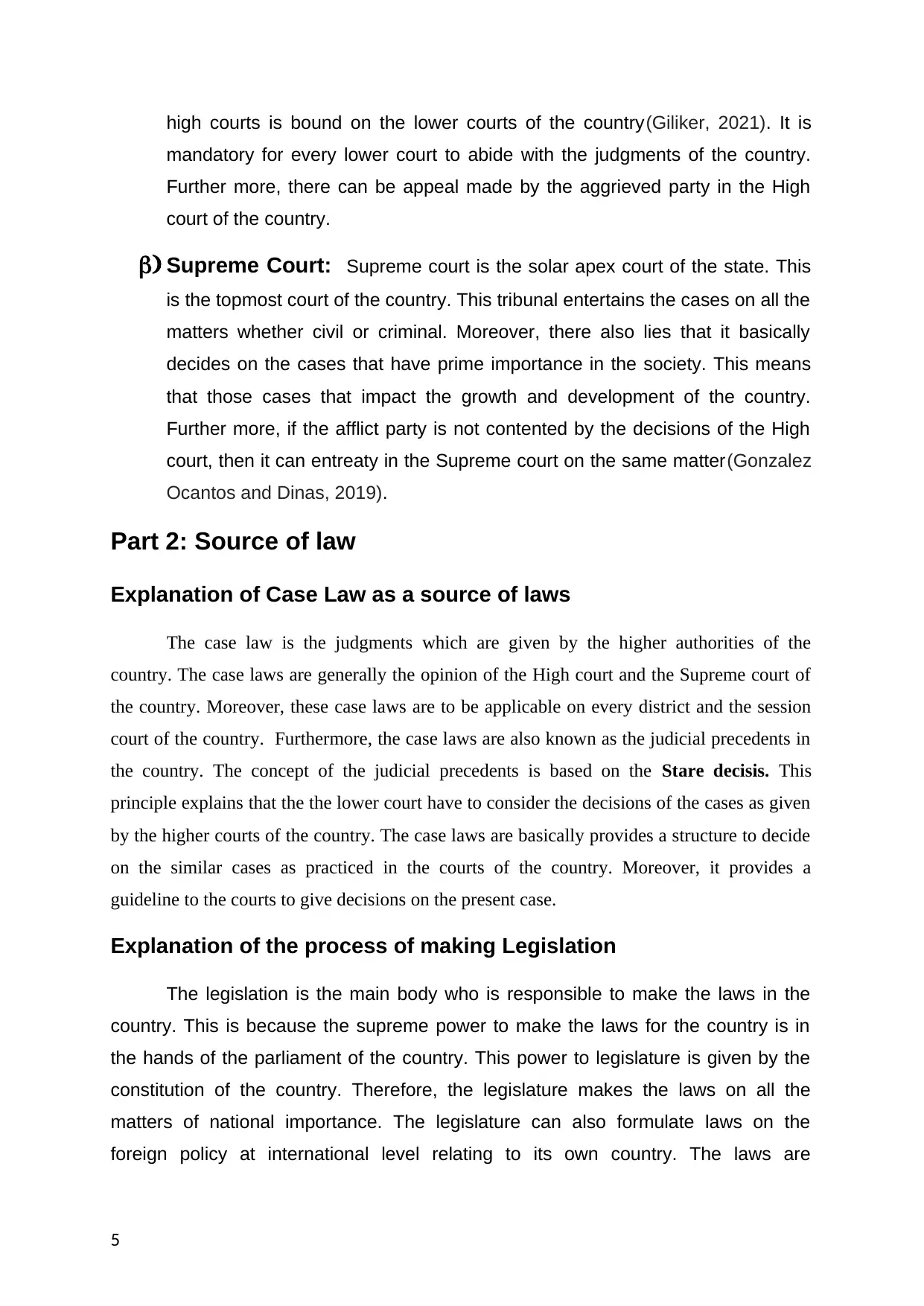
high courts is bound on the lower courts of the country(Giliker, 2021). It is
mandatory for every lower court to abide with the judgments of the country.
Further more, there can be appeal made by the aggrieved party in the High
court of the country.
b) Supreme Court: Supreme court is the solar apex court of the state. This
is the topmost court of the country. This tribunal entertains the cases on all the
matters whether civil or criminal. Moreover, there also lies that it basically
decides on the cases that have prime importance in the society. This means
that those cases that impact the growth and development of the country.
Further more, if the afflict party is not contented by the decisions of the High
court, then it can entreaty in the Supreme court on the same matter(Gonzalez
Ocantos and Dinas, 2019).
Part 2: Source of law
Explanation of Case Law as a source of laws
The case law is the judgments which are given by the higher authorities of the
country. The case laws are generally the opinion of the High court and the Supreme court of
the country. Moreover, these case laws are to be applicable on every district and the session
court of the country. Furthermore, the case laws are also known as the judicial precedents in
the country. The concept of the judicial precedents is based on the Stare decisis. This
principle explains that the the lower court have to consider the decisions of the cases as given
by the higher courts of the country. The case laws are basically provides a structure to decide
on the similar cases as practiced in the courts of the country. Moreover, it provides a
guideline to the courts to give decisions on the present case.
Explanation of the process of making Legislation
The legislation is the main body who is responsible to make the laws in the
country. This is because the supreme power to make the laws for the country is in
the hands of the parliament of the country. This power to legislature is given by the
constitution of the country. Therefore, the legislature makes the laws on all the
matters of national importance. The legislature can also formulate laws on the
foreign policy at international level relating to its own country. The laws are
5
mandatory for every lower court to abide with the judgments of the country.
Further more, there can be appeal made by the aggrieved party in the High
court of the country.
b) Supreme Court: Supreme court is the solar apex court of the state. This
is the topmost court of the country. This tribunal entertains the cases on all the
matters whether civil or criminal. Moreover, there also lies that it basically
decides on the cases that have prime importance in the society. This means
that those cases that impact the growth and development of the country.
Further more, if the afflict party is not contented by the decisions of the High
court, then it can entreaty in the Supreme court on the same matter(Gonzalez
Ocantos and Dinas, 2019).
Part 2: Source of law
Explanation of Case Law as a source of laws
The case law is the judgments which are given by the higher authorities of the
country. The case laws are generally the opinion of the High court and the Supreme court of
the country. Moreover, these case laws are to be applicable on every district and the session
court of the country. Furthermore, the case laws are also known as the judicial precedents in
the country. The concept of the judicial precedents is based on the Stare decisis. This
principle explains that the the lower court have to consider the decisions of the cases as given
by the higher courts of the country. The case laws are basically provides a structure to decide
on the similar cases as practiced in the courts of the country. Moreover, it provides a
guideline to the courts to give decisions on the present case.
Explanation of the process of making Legislation
The legislation is the main body who is responsible to make the laws in the
country. This is because the supreme power to make the laws for the country is in
the hands of the parliament of the country. This power to legislature is given by the
constitution of the country. Therefore, the legislature makes the laws on all the
matters of national importance. The legislature can also formulate laws on the
foreign policy at international level relating to its own country. The laws are
5
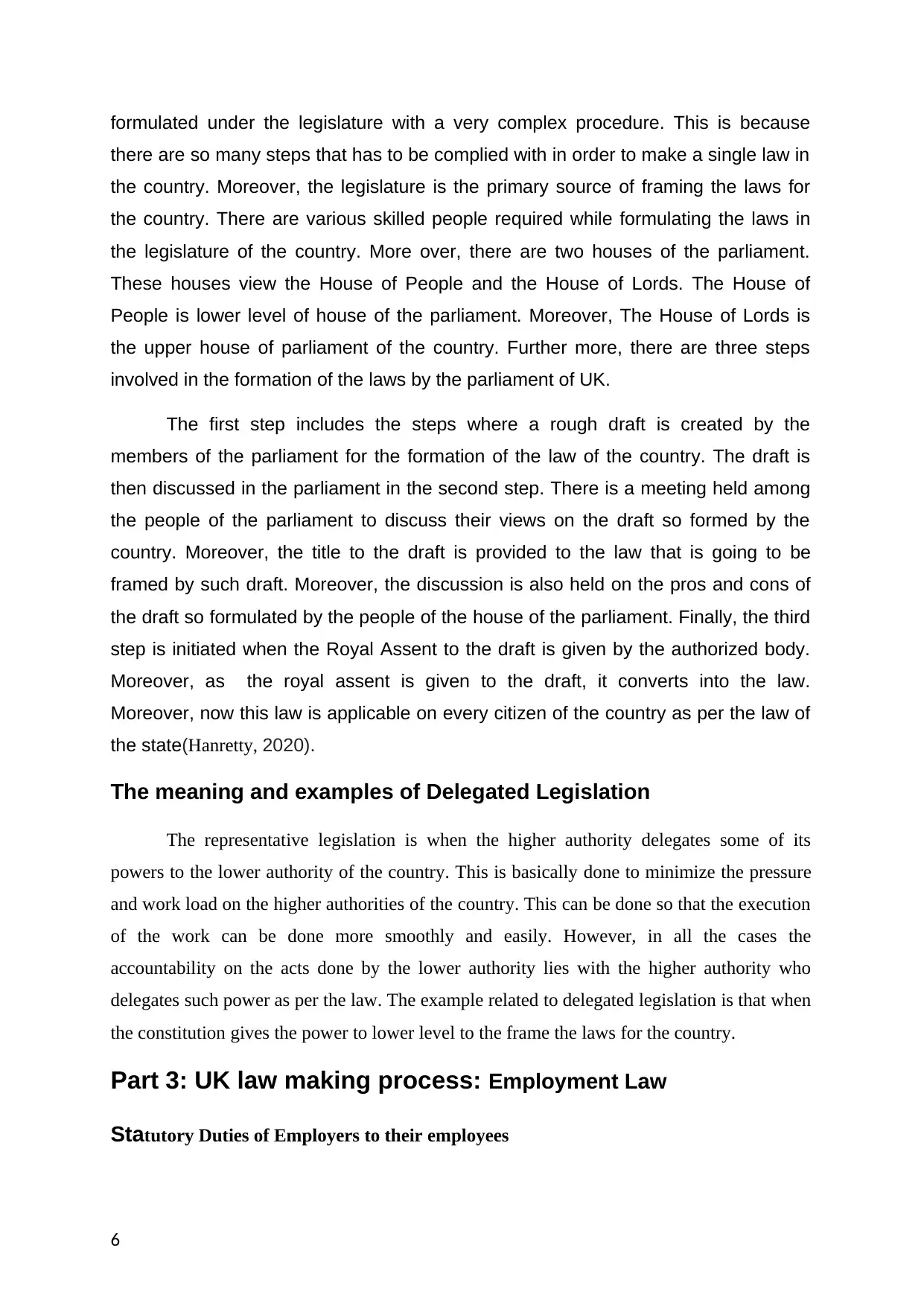
formulated under the legislature with a very complex procedure. This is because
there are so many steps that has to be complied with in order to make a single law in
the country. Moreover, the legislature is the primary source of framing the laws for
the country. There are various skilled people required while formulating the laws in
the legislature of the country. More over, there are two houses of the parliament.
These houses view the House of People and the House of Lords. The House of
People is lower level of house of the parliament. Moreover, The House of Lords is
the upper house of parliament of the country. Further more, there are three steps
involved in the formation of the laws by the parliament of UK.
The first step includes the steps where a rough draft is created by the
members of the parliament for the formation of the law of the country. The draft is
then discussed in the parliament in the second step. There is a meeting held among
the people of the parliament to discuss their views on the draft so formed by the
country. Moreover, the title to the draft is provided to the law that is going to be
framed by such draft. Moreover, the discussion is also held on the pros and cons of
the draft so formulated by the people of the house of the parliament. Finally, the third
step is initiated when the Royal Assent to the draft is given by the authorized body.
Moreover, as the royal assent is given to the draft, it converts into the law.
Moreover, now this law is applicable on every citizen of the country as per the law of
the state(Hanretty, 2020).
The meaning and examples of Delegated Legislation
The representative legislation is when the higher authority delegates some of its
powers to the lower authority of the country. This is basically done to minimize the pressure
and work load on the higher authorities of the country. This can be done so that the execution
of the work can be done more smoothly and easily. However, in all the cases the
accountability on the acts done by the lower authority lies with the higher authority who
delegates such power as per the law. The example related to delegated legislation is that when
the constitution gives the power to lower level to the frame the laws for the country.
Part 3: UK law making process: Employment Law
Statutory Duties of Employers to their employees
6
there are so many steps that has to be complied with in order to make a single law in
the country. Moreover, the legislature is the primary source of framing the laws for
the country. There are various skilled people required while formulating the laws in
the legislature of the country. More over, there are two houses of the parliament.
These houses view the House of People and the House of Lords. The House of
People is lower level of house of the parliament. Moreover, The House of Lords is
the upper house of parliament of the country. Further more, there are three steps
involved in the formation of the laws by the parliament of UK.
The first step includes the steps where a rough draft is created by the
members of the parliament for the formation of the law of the country. The draft is
then discussed in the parliament in the second step. There is a meeting held among
the people of the parliament to discuss their views on the draft so formed by the
country. Moreover, the title to the draft is provided to the law that is going to be
framed by such draft. Moreover, the discussion is also held on the pros and cons of
the draft so formulated by the people of the house of the parliament. Finally, the third
step is initiated when the Royal Assent to the draft is given by the authorized body.
Moreover, as the royal assent is given to the draft, it converts into the law.
Moreover, now this law is applicable on every citizen of the country as per the law of
the state(Hanretty, 2020).
The meaning and examples of Delegated Legislation
The representative legislation is when the higher authority delegates some of its
powers to the lower authority of the country. This is basically done to minimize the pressure
and work load on the higher authorities of the country. This can be done so that the execution
of the work can be done more smoothly and easily. However, in all the cases the
accountability on the acts done by the lower authority lies with the higher authority who
delegates such power as per the law. The example related to delegated legislation is that when
the constitution gives the power to lower level to the frame the laws for the country.
Part 3: UK law making process: Employment Law
Statutory Duties of Employers to their employees
6
⊘ This is a preview!⊘
Do you want full access?
Subscribe today to unlock all pages.

Trusted by 1+ million students worldwide
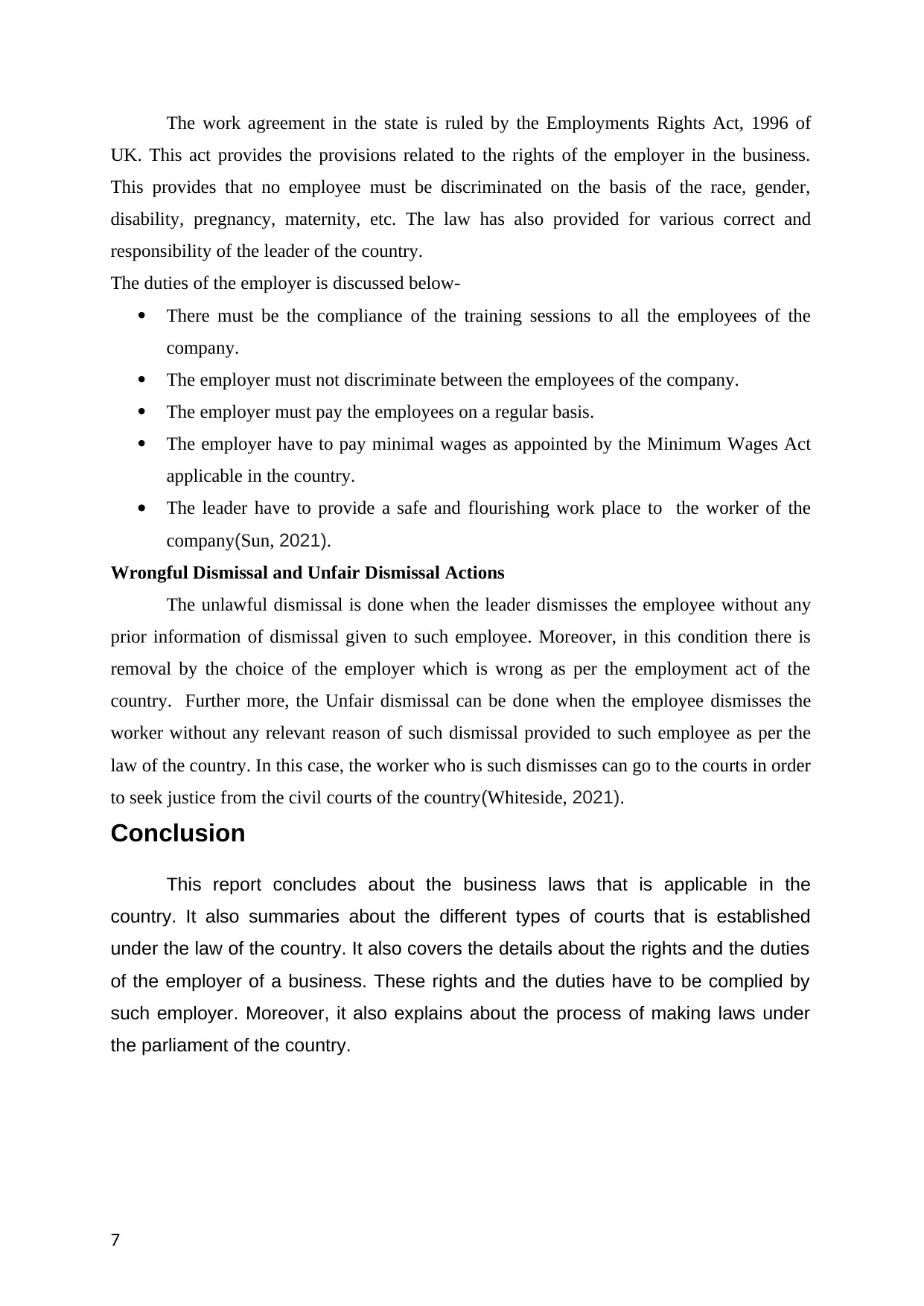
The work agreement in the state is ruled by the Employments Rights Act, 1996 of
UK. This act provides the provisions related to the rights of the employer in the business.
This provides that no employee must be discriminated on the basis of the race, gender,
disability, pregnancy, maternity, etc. The law has also provided for various correct and
responsibility of the leader of the country.
The duties of the employer is discussed below-
There must be the compliance of the training sessions to all the employees of the
company.
The employer must not discriminate between the employees of the company.
The employer must pay the employees on a regular basis.
The employer have to pay minimal wages as appointed by the Minimum Wages Act
applicable in the country.
The leader have to provide a safe and flourishing work place to the worker of the
company(Sun, 2021).
Wrongful Dismissal and Unfair Dismissal Actions
The unlawful dismissal is done when the leader dismisses the employee without any
prior information of dismissal given to such employee. Moreover, in this condition there is
removal by the choice of the employer which is wrong as per the employment act of the
country. Further more, the Unfair dismissal can be done when the employee dismisses the
worker without any relevant reason of such dismissal provided to such employee as per the
law of the country. In this case, the worker who is such dismisses can go to the courts in order
to seek justice from the civil courts of the country(Whiteside, 2021).
Conclusion
This report concludes about the business laws that is applicable in the
country. It also summaries about the different types of courts that is established
under the law of the country. It also covers the details about the rights and the duties
of the employer of a business. These rights and the duties have to be complied by
such employer. Moreover, it also explains about the process of making laws under
the parliament of the country.
7
UK. This act provides the provisions related to the rights of the employer in the business.
This provides that no employee must be discriminated on the basis of the race, gender,
disability, pregnancy, maternity, etc. The law has also provided for various correct and
responsibility of the leader of the country.
The duties of the employer is discussed below-
There must be the compliance of the training sessions to all the employees of the
company.
The employer must not discriminate between the employees of the company.
The employer must pay the employees on a regular basis.
The employer have to pay minimal wages as appointed by the Minimum Wages Act
applicable in the country.
The leader have to provide a safe and flourishing work place to the worker of the
company(Sun, 2021).
Wrongful Dismissal and Unfair Dismissal Actions
The unlawful dismissal is done when the leader dismisses the employee without any
prior information of dismissal given to such employee. Moreover, in this condition there is
removal by the choice of the employer which is wrong as per the employment act of the
country. Further more, the Unfair dismissal can be done when the employee dismisses the
worker without any relevant reason of such dismissal provided to such employee as per the
law of the country. In this case, the worker who is such dismisses can go to the courts in order
to seek justice from the civil courts of the country(Whiteside, 2021).
Conclusion
This report concludes about the business laws that is applicable in the
country. It also summaries about the different types of courts that is established
under the law of the country. It also covers the details about the rights and the duties
of the employer of a business. These rights and the duties have to be complied by
such employer. Moreover, it also explains about the process of making laws under
the parliament of the country.
7
Paraphrase This Document
Need a fresh take? Get an instant paraphrase of this document with our AI Paraphraser
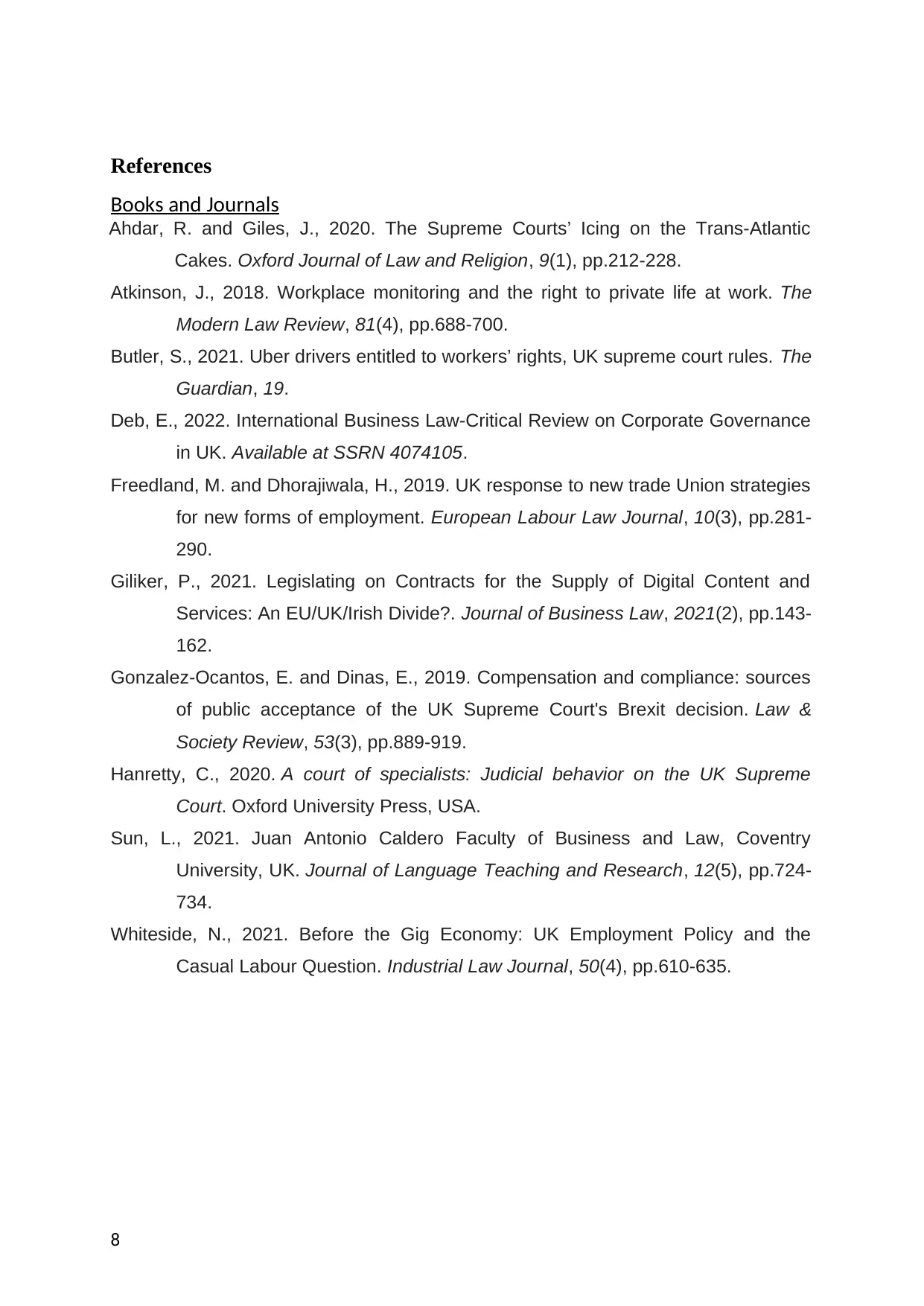
References
Books and Journals
Ahdar, R. and Giles, J., 2020. The Supreme Courts’ Icing on the Trans-Atlantic
Cakes. Oxford Journal of Law and Religion, 9(1), pp.212-228.
Atkinson, J., 2018. Workplace monitoring and the right to private life at work. The
Modern Law Review, 81(4), pp.688-700.
Butler, S., 2021. Uber drivers entitled to workers’ rights, UK supreme court rules. The
Guardian, 19.
Deb, E., 2022. International Business Law-Critical Review on Corporate Governance
in UK. Available at SSRN 4074105.
Freedland, M. and Dhorajiwala, H., 2019. UK response to new trade Union strategies
for new forms of employment. European Labour Law Journal, 10(3), pp.281-
290.
Giliker, P., 2021. Legislating on Contracts for the Supply of Digital Content and
Services: An EU/UK/Irish Divide?. Journal of Business Law, 2021(2), pp.143-
162.
Gonzalez‐Ocantos, E. and Dinas, E., 2019. Compensation and compliance: sources
of public acceptance of the UK Supreme Court's Brexit decision. Law &
Society Review, 53(3), pp.889-919.
Hanretty, C., 2020. A court of specialists: Judicial behavior on the UK Supreme
Court. Oxford University Press, USA.
Sun, L., 2021. Juan Antonio Caldero Faculty of Business and Law, Coventry
University, UK. Journal of Language Teaching and Research, 12(5), pp.724-
734.
Whiteside, N., 2021. Before the Gig Economy: UK Employment Policy and the
Casual Labour Question. Industrial Law Journal, 50(4), pp.610-635.
8
Books and Journals
Ahdar, R. and Giles, J., 2020. The Supreme Courts’ Icing on the Trans-Atlantic
Cakes. Oxford Journal of Law and Religion, 9(1), pp.212-228.
Atkinson, J., 2018. Workplace monitoring and the right to private life at work. The
Modern Law Review, 81(4), pp.688-700.
Butler, S., 2021. Uber drivers entitled to workers’ rights, UK supreme court rules. The
Guardian, 19.
Deb, E., 2022. International Business Law-Critical Review on Corporate Governance
in UK. Available at SSRN 4074105.
Freedland, M. and Dhorajiwala, H., 2019. UK response to new trade Union strategies
for new forms of employment. European Labour Law Journal, 10(3), pp.281-
290.
Giliker, P., 2021. Legislating on Contracts for the Supply of Digital Content and
Services: An EU/UK/Irish Divide?. Journal of Business Law, 2021(2), pp.143-
162.
Gonzalez‐Ocantos, E. and Dinas, E., 2019. Compensation and compliance: sources
of public acceptance of the UK Supreme Court's Brexit decision. Law &
Society Review, 53(3), pp.889-919.
Hanretty, C., 2020. A court of specialists: Judicial behavior on the UK Supreme
Court. Oxford University Press, USA.
Sun, L., 2021. Juan Antonio Caldero Faculty of Business and Law, Coventry
University, UK. Journal of Language Teaching and Research, 12(5), pp.724-
734.
Whiteside, N., 2021. Before the Gig Economy: UK Employment Policy and the
Casual Labour Question. Industrial Law Journal, 50(4), pp.610-635.
8

9
⊘ This is a preview!⊘
Do you want full access?
Subscribe today to unlock all pages.

Trusted by 1+ million students worldwide
1 out of 9
Related Documents
Your All-in-One AI-Powered Toolkit for Academic Success.
+13062052269
info@desklib.com
Available 24*7 on WhatsApp / Email
![[object Object]](/_next/static/media/star-bottom.7253800d.svg)
Unlock your academic potential
Copyright © 2020–2025 A2Z Services. All Rights Reserved. Developed and managed by ZUCOL.

